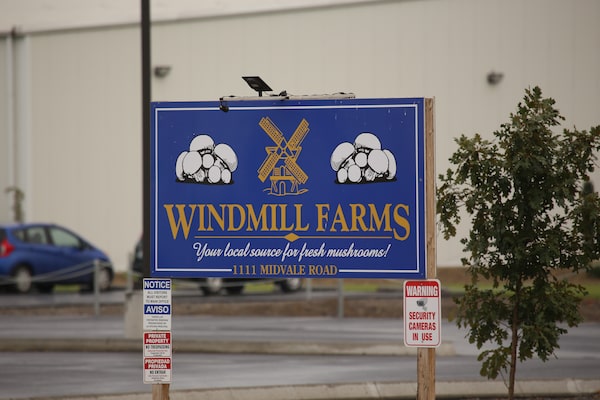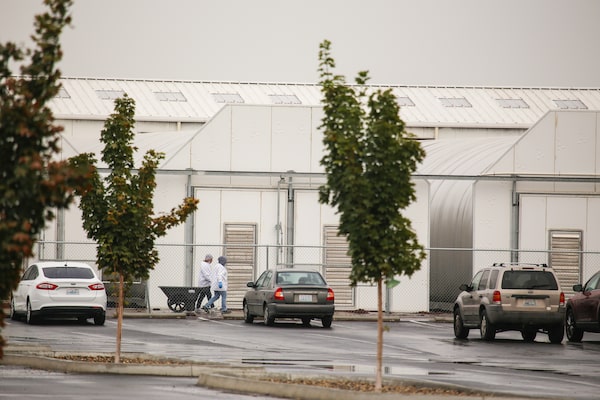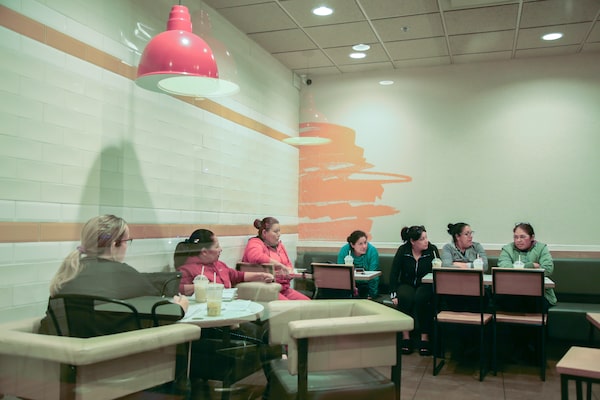
Windmills Farms, which is owned by Toronto-based Instar Asset Management Inc., is located in Sunnyside, Wash.Nathan Vanderklippe/The Globe and Mail
Dusk brought deep blue to the eastern Washington skies as a small group of mushroom farm workers gathered in the back of a McDonald’s. They chatted as they waited for others to join, until word came that those not yet there were unlikely to finish work until nearly midnight.
And so, shortly before 7 p.m., someone bought milkshakes and handed them around. The workers sucked on straws as they described their week at the farm, where managers had just warned they would be mixing up groups of workers and assigning each group a new leader each month.
It was a way, one of the workers suggested, to boost production among new hires – and earn more money for Instar Asset Management Inc., the Canadian company that bought the farm in Sunnyside, Wash., this past February through an Ontario-based subsidiary, Windmill Farms.
Not everyone was pleased about the change in group assignments. A rumour had circulated, which one of the farm employees in the McDonald’s called false, that the mushroom workers were passing around a petition calling for the firing of certain managers.
Victoria Ruddy, a representative of the United Farm Workers, interjected.
“Until we have a union contract, we won’t have protection against the supervisors,” she told the workers, addressing them in Spanish. “So right now, we would be wasting our time to try to fire anyone.”
Regular meetings of mushroom workers here have yet to achieve anything close to a union contract. But they form part of a wider-reaching effort to use the current swell of union activism – propelled by a range of different kinds of employees, including actors and screenwriters, baristas, parcel deliverers and auto workers – to reverse nearly a century of precedent that has left agricultural workers on the sidelines of organized labour.

Gloria Solis Jimenez was let go from the Windmill Farms mushroom operation this summer.Nathan Vanderklippe/The Globe and Mail
Existing U.S. law makes it nearly impossible for people who work on farms in Washington state to unionize. Only in California and New York do such employees enjoy collective bargaining rights.
More than 200 kilometres southeast of Seattle, the mushroom operation is situated in the Yakima Valley, an agricultural oasis criss-crossed by rows of apple trees, hops, vines, corn and, in springtime, asparagus.
This landscape has frequently been a setting for labour activism. In the 1970s, workers in hop fields here led wildcat strikes. Cesar Chavez, the controversial face of modern agricultural organizing in the southwestern U.S., visited the area several times, once leading a march to demand more pay for asparagus cutters.
Now, the United Farm Workers union that Mr. Chavez co-founded has once again turned its attention to the region, with a campaign to organize the mushroom plant’s workers.
Standing in its way is not only Washington state law but also Instar, whose executives say employees there have no need of a union.
In Washington and most other states, agricultural companies can simply ignore demands to unionize, as the former owners of the Sunnyside mushroom farm did when more than 200 workers signed a petition last year demanding union representation.
Early this September, workers tried again. More than 250 signed a petition whose demands included the right to negotiate pay and production quotas – and for the current owner, Windmill, to “recognize our union and begin negotiations of a labour agreement.”
Among the signatories was Jose Martinez, a labourer with a track record of winning rights for workers. Mr. Martinez played a central role in a lawsuit that prodded Washington state to provide agricultural workers with overtime pay.
When the mushroom farm came to Sunnyside, he was among its first employees. But dissatisfaction made him an early supporter of attempts to unionize. In April, he joined workers chanting “sí se puede” – “yes we can” – and marched alongside UFW president Teresa Romero outside the farm.

Workers at Windmills Farms on Sept. 24.Nathan Vanderklippe/The Globe and Mail
Two days later, he was fired. Windmill said in a statement that his dismissal had nothing to do with his union activities. Mr. Martinez acknowledges that he picked, on average, 43 pounds of mushrooms an hour. The company tells workers they must pick 50 pounds an hour.
But workers say those demands are unreasonable. (On a September production sheet viewed by The Globe and Mail, fewer than a quarter of the farm’s workers were listed as having attained 50 pounds.)
Mr. Martinez has now focused his attention on systemic change. He recently visited a unionized mushroom farm in California. “Everything was very different,” he said. “People were working at their own pace.”
“In the not-too-distant future, I would like Washington to have the same law California does – where workers can vote to join a union,” he said.
The mushroom workers’ efforts to organize are the first steps, he said. The UFW sees this farm as a point of leverage in seeking the same law in Washington state.
“This time, will the labour movement fully include all of the workers in America, including agricultural workers, immigrant workers and Latino workers?” asked Antonio De Loera-Brust, who leads communications for the UFW.
“Long-term, the labour movement can’t succeed in this country as long as such a large and essential portion of it is excluded from the most basic kind of labour rights and protections that are afforded to other workers,” he said.
There is good reason to question whether the mushroom workers can succeed. U.S. agricultural unionization rates are so low that they are practically zero. Membership in the UFW has fallen by roughly 90 per cent since its height decades ago under Mr. Chavez, and unionization across the U.S. economy has fallen to 10.1 per cent, half what it was 40 years ago. Even in California, a raspberry grower shut its doors in 2020 rather than allow its work force to unionize.
The mushroom workers, too, are employed by a corporate owner firmly opposed to their efforts.
“Our workers don’t need to be served by a third-party representative. We’re better off to deal with them directly,” said Clay Taylor, who recently stepped down as Windmill Farms CEO, but continues as an adviser. The 50-pound production target is fair, he said.
No one has been terminated for union activities, he said. He declined to comment on Mr. Martinez, citing privacy rules. (The termination form, viewed by The Globe, says he was “not performing as needed.”)
Windmill has made efforts to improve the farm since acquiring it in February, Mr. Taylor said.

Current and former mushroom farm workers meet with representatives of the United Farm Workers at a McDonald’s in Sunnyside, Wash.Nathan Vanderklippe/The Globe and Mail
“We’re investing a lot of money there to better the working performance of equipment, so the employees have a better life than what they had before,” he said.
“I was there just a few weeks ago, and folks were smiling,” he added.
Windmill declined a Globe request to visit the farm. In a statement, incoming chief executive Ed Carolan said, “We are focused on ensuring a healthy and safe workplace at Sunnyside and plan to continue investing in our operations, which will generate additional job opportunities and contribute significantly to the local economy.”
Several current and former employees who spoke with The Globe had a different view. At a Mexican dinner arranged by the UFW on a recent Sunday night, RosaIsela Cabrera arrived just before 7 p.m. She had just finished a shift that started at 5 a.m.
Asked what has changed under Windmill, her response was brief: “Nada.”
“If anything, it’s worse. Because the other company let us get out early on the weekends, and this company doesn’t,” she said. The number of mushroom pickers has declined, she added. That means more pressure. “So they’re yelling at us to hurry hurry hurry.”
It was only a few years ago that Sunnyside rolled out the red carpet for the mushroom farm. The operation stood to spare workers long commutes to distant fields. Because mushrooms are grown indoors, it also offered steady hours, a change from the seasonal employment of outdoor crops.
“We worked hard to bring them in,” said Sunnyside Mayor Dean Broersma.
For the area’s lower-skilled labourers, it sounded like “a better paying job that could get them to buy better homes than they were living in,” he said.
Mushrooms are an extraordinary crop, capable of doubling in size every 24 hours. Grown on layers of racks, workers harvest them according to their relative size. They grow so fast that a mushroom considered too small can sometimes be picked just two hours later.
That rapid growth can add to pressure to pick quickly, one of a long list of complaints workers have accumulated against the mushroom farm since its opening.
Onesimo Jaime, who left the farm in early 2022, said the pressure left him so unwell that a doctor prescribed him anti-anxiety medication, which he continues to take.
Gloria Solis Jimenez described workdays that began at 7 a.m. and would not end until the early hours of the following day. Supervisors cracked down on those not working fast enough. “We would get warnings if we weren’t meeting quota,” Ms. Jimenez said. Long hours made it difficult to spend time with children or schedule appointments.
“You would be much happier in that job if you were treated with humanity,” she said. “There’s just no humanity, no concern for the worker.”
She was let go this summer.
Before Windmill came in, the previous owner was fined US$3.4-million for gender discrimination and other unfair practices. Another investigation related to use of child labour and other potential violations is continuing.
Mr. Taylor said such problems are in the past.
“The issues stem from the previous ownership,” he said, adding that he couldn’t comment on what had happened prior to the acquisition.
The UFW says it will keep trying to unionize the mushroom farm. And it says workers from other agricultural industries in eastern Washington have already begun to express interest.
The issues raised by mushroom workers are “having a big impact in the fields,” said Lorena Abalos, a UFW organizer in the area. “We thought we didn’t have rights. Now we’re learning how to stand up for ourselves.”